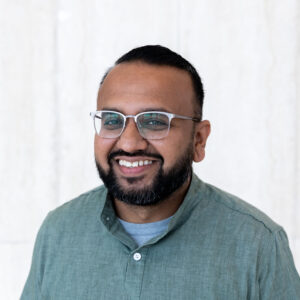Bioinformatics Scientist
Center for Data Driven Discovery in Biomedicine
Ammar Naqvi is a Bioinformatics Scientist responsible for investigating a variety of large-scale multi-omic datasets to elucidate mechanisms in pediatric cancer. In particular he is utilizing machine learning and predictive modeling combined with the traditional molecular biology to understand basic molecular mechanisms underlying tumorigenesis. In harnessing and leveraging big data, he hopes his efforts will generate new hypotheses and advance biomedical science
Ammar’s research focuses on combining his interdisciplinary expertise in Bioinformatics, RNA biology and cancer. His broad research interests are focused on understanding regulatory and transcriptional mechanisms that contribute to oncogenesis, tumor evolution and progression in pediatric cancers. He hopes in elucidating these fundamental processes, that will then inform therapeutic regimens and/or lead to novel therapeutics.
Prior to joining the D3b Center in January of 2020, Ammar studied small non-coding RNA biology during his PhD tenure, while making seminal contributions to the field, discovering components of non-coding biogenesis and processing. To further increase the translational relevance of his research, he transitioned from studying model organisms to human samples at the Children’s Hospital of Philadelphia (CHOP). For his postdoctoral training he joined the lab of Dr. Andrei Thomas-Tikhonenko at the Center for Childhood Cancer Research (CCCR) and the Department of Biomedical and Health Informatics (DBHi), combining aspects of advanced statistical modeling and bioinformatics with experimental validations and rigor. There he lead key studies describing the transcriptome-wide dysregulation of alternative splicing and RNA processing in hematologic malignancies. He also lead efforts in neoepitope discovery, validation, and therapeutic development.
Ammar earned a BS in Bioinformatics from the Rochester Institute of Technology and an MS in Bioinformatics and Computational Biology from George Mason University before completing a PhD program in Computational and Integrative Biology from Rutgers University. He is driven by his passion in applying his skillset and knowledge-base to alleviate childhood cancer. He was attracted to D3b’s unprecedented openness, collaborative and interdisciplinary environment to ultimately facilitate and transform discoveries to the clinic on behalf of children.

